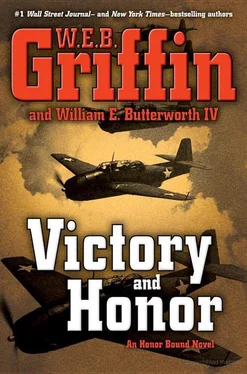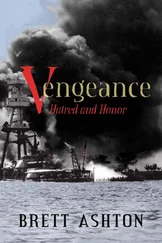“They were involved in the bombing?”
“In the plot of the bombing,” Frade explained, “as were Peter’s father, Generalleutnant Graf Karl-Friedrich von Wachtstein, and Karl’s father, Vizeadmiral Kurt Boltitz. General von Wachtstein was arrested, tried by a people’s court, and hung from a butcher’s hook.”
“My God!”
“Vizeadmiral Boltitz, who worked for Admiral Wilhelm Canaris, the chief of German Military Intelligence, was not immediately arrested, nor was Admiral Canaris. We don’t know where Vizeadmiral Boltitz is, only that the SS was looking for him until the last day of the war.”
“He ran?” Bendick asked.
Frade nodded.
“On April twenty-third—just over two weeks ago—the 97th Infantry Division of the Third U.S. Army liberated the Flossenberg Concentration Camp in Bavaria. They found Admiral Canaris’s naked, decomposing body hanging from a gallows. It had been left there as a gesture of contempt following the admiral’s execution on April ninth for his role in the failed attempt to kill Hitler.”
“Jesus Christ!” Bendick said, then asked, “And these two German officers ran from the arrest order to Argentina?”
“No. What happened—both had been working for me—was that I flew them to Canoas, where they surrendered to the commanding officer. They were then flown to the senior enemy officer interrogation facility at Fort Hunt, outside Washington.”
“If they had been working for you, why didn’t you just keep them in Argentina?”
“Argentina was then neutral. Leaning strongly toward the Axis, but neutral. If von Wachtstein and Boltitz had stayed there, there was a good chance that some Argentine Nazi would learn where they were, tell the German Embassy, and the SS would go after them. Try to kill them.”
“They’d actually do something like that?”
“They already had done something like that. They tried to kill the commercial attaché of the German Embassy, who had deserted his post. Boltitz and von Wachtstein were no longer of any use to me inside the German Embassy, so getting them into a POW enclosure in the States seemed to be the right thing to do.”
“But they’re not in a POW enclosure, are they?”
“No. They are now OSS special agents—show him your ID, Hansel.”
Peter did.
Bendick nodded his acceptance.
Frade went on: “I knew I was going to need them, so last week—on May tenth—I flew to Washington and got them.”
General Bendick looked at von Wachtstein and, shaking his head in disbelief, asked, “And you were the air attaché of the German Embassy?”
“Tell him, Hansel,” Frade ordered.
“Before that,” von Wachtstein said, “I was commanding officer of Jagdstaffel 232—Focke-Wulf 190s—defending Berlin against B-17s.”
Bendick shook his head again and then asked Frade, “They were turned over to you—is that what you’re saying?”
“No, what I said was that I needed them, so I went and got them. I didn’t have the time to deal with the bureaucracy.”
“You just took them from a POW camp on your own authority?”
Frade nodded.
Bendick again shook his head in disbelief.
Frade said: “Your original question, Bob, was something like ‘Why should I trust Boltitz?’”
Bendick met Frade’s eyes. “Has it occurred to you, Colonel Frade, that the smart thing for me to do is pick up that telephone and tell my provost marshal to come running? That two escaped German POWs and the guy who helped them escape are in flight planning?”
Frade held the gaze and said, “You could do that, General. It’s known as ‘covering your ass.’ But you won’t.”
“And why won’t I?”
“Two reasons. One is that you know that if you did, you’d be helping the Nazis get away with sending their submarines to South America, and you don’t want to do that. Two, you’re not that kind—the CYA kind—of an officer.”
“How do you know? Was telling me all this smart?”
“Probably not. But in my business, every once in a while you have to take a chance. I took it. I’d take it again.”
“Taking a chance like putting a shot-up B-17 down on a fighter strip? Because it wasn’t really an option?”
“Yes, sir.”
General Bendick turned to his aide-de-camp.
“Jimmy,” he ordered, “get on the horn and get Colonel DuBois and Colonel Nathan down here. Tell them I’m running a middle-of-the-night training program in how to find submarines.”
Transient Mess Val de Cans Airfield Belém do Pará, Brazil 0405 17 May 1945
SAA Chief Pilot Gonzalo Delgano, Captain Mario Peralta, and a flight engineer whose name Clete could never remember—he thought of him as “the chubby flight engineer, who, three-to-one, also works for the BIS”—were sitting over coffee at a table near the door when Clete and the others walked in.
The diplomats were sitting at various tables around the nearly empty mess.
“We wondered where you were,” Delgano greeted them.
“We all set to go?” Clete replied.
“Anytime you are. Weather looks good, and we may even get that tailwind.”
“Just as soon we have some breakfast,” Clete said.
“You haven’t eaten?” Delgano asked.
“No. That’s why we’re going to eat now,” Clete said.
If you’d have come out and just asked, “What have you been up to?” I probably would have told you.
“El Señor Nulder wondered what had happened to you,” Delgano said.
“And asked you?”
Delgano nodded.
“What did you tell him?”
“The truth. I didn’t know.”
Clete ordered: “Enrico, why don’t you go ask Señor Nulder if he can spare a moment for me?”
* * *
It was the first time that Frade had gotten a good look at Rodolfo Nulder, the director of security at the Secretariat of Labor and Retirement Plans. He thought there was something about him—his carriage, a hint of arrogance—that suggested a military background.
Nulder smiled and put out his hand as he approached the table.
“I’m Rodolfo Nulder, Señor Frade,” he announced with a charming smile.
“So Capitán Delgano has been telling me.”
“Did he also tell you that I was at both the military academy and the Kriegsschule with your father?”
“No, as a matter of fact, he didn’t,” Frade lied, somewhat deflating Nulder’s arrogance, if only for a moment. “But he did tell me, when I asked him who was in charge of our cargo of diplomats, that you probably were. True?”
“When I left the army, I became involved with governmental security. I’m presently the director of security for the Secretariat of Labor and Retirement Plans—”
“The Secretariat of Labor and Retirement Plans?” Frade interrupted. “Or the Secretary of Labor and Retirement Plans?”
Nulder raised his eyebrows, then said, “Actually, I suppose one could say that both are true. I sometimes assist el Coronel Perón in security matters outside the Secretariat of Labor and Retirement Plans. This is one of those occasions. Actually, Señor Frade, I was hoping to have a word with you, to explain my role in this mission, when we arrived here. But then no one seemed to know where you were.”
“No one did,” Frade said.
Nulder’s charming smile flickered off and then came back on.
He said: “I was going to tell you that in his role as vice president, el Coronel Perón thought, because I know Germany, that I would be useful in carrying out the mission President Farrell had assigned to the Foreign Ministry, and asked me to participate.”
“Does that mean you’re the man in charge?” Frade asked, not very pleasantly.
“Let me put it this way. Think of me as the liaison officer between yourself, as the managing director of SAA, and the senior Foreign Ministry officer, Ambassador Giménez, on this mission.”
Читать дальше












